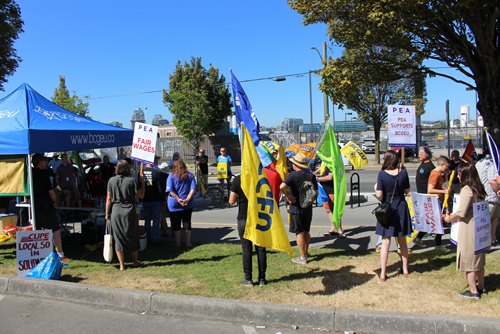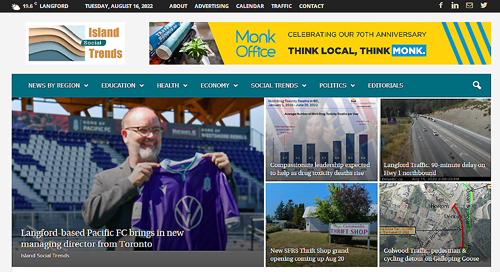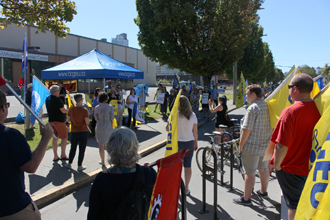
Wednesday August 17, 2022 | VICTORIA, BC [Updated 5:28 pm]
by Mary P Brooke, Editor | Island Social Trends
In hot blue-sky summer weather in an industrial part of downtown Victoria, the BC General Employees Union (BCGEU) President and her supporters rallied their supporters streetside. Many honks from truckers and others driving by in the 2200-block of Government Street punctuated the speeches during their rally from 10:30 am to 12 noon.
There were plenty of supporters with signs and a few rallying cries about fighting for their rights. “We shall overcome” was one of the chants.
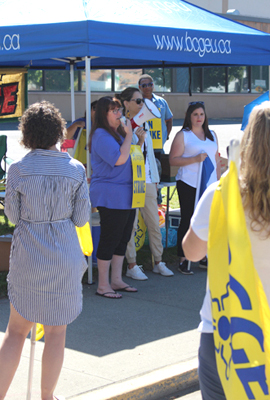
BCGEU President Stephanie Smith used a megaphone to deliver a few words to the crowd of about 100 people mid-way through the 90-minute time slot. Several unions were represented there today.
BCGEU pleased with turnout:
Smith said she was pleased with the turnout. That included people of a wide age range (young to old) and leadership from the BC Federation of Labour, the Professional Employees Association (PEA), Victoria Labour Council, and Ferry Marine Workers Union.
“It’s about the cost of living and about solidarity here in BC. We take that work very seriously in the labour movement here,” Smith told Island Social Trends in an interview on the sidewalk.
Starting up slowly:
So far, BCGEU is keeping things light.
As announced with BCGEU 72-hour strike notice last Friday, BCGEU presently has two strike locations in the Lower Mainland (Delta and Richmond), one in Victoria and one in Kamloops. Those are at BC Liquor Distribution Centres on the mainland, and in Victoria at wholesale customer centre on Government Street.
Also starting up slowly, today the Professional Employees Association (PEA) announced this morning that at noon today they would be issuing a 72-hr strike notice against the BC government, announced streetside in solidarity with BCGEU. Both unions are seeking wage protection.
Rotating to other locations:
BCGEU will be rotating their strikes to other locations, with four locations at this point. Impact on the liquor sector gets attention. Retail stores are not impacted at this point — direction line services at liquor and cannabis stores are not impacted at this time.
Smith explains that the BCGEU’s bargaining committee goal “was never to go on strike”.
“Our goal was to get a deal. Our bargaining committee wanted to be very thoughtful, strategic. They wanted to maximize the impact to our employer, which is government. But we wanted to minimize as much as possible impact to our member and to the public,” Smith told Island Social Trends today.
Getting government back to the table:
“Right from the get-go, if we have to escalate we will consider that. But our hope is that when government sees how resolved our members are in getting a deal that they deserve, that they’ll invite us back to the table with a meaningful proposal,” says the BCGEU president.
“In terms of how long the strike will last and how that impact might look like, it’s entirely up to the employer at this point,” Smith purports.
“There’s a pathway to a deal, absolutely. The challenge for us in this round… it isn’t just about percentage wage increases,” the BCGEU president said. “It’s about protecting those wage increases against rising rates of inflation,” said Smith.
Cost of living impacts:
Smith says that “the last wage increase these members got was two percent in April 2021 and inflation rates haven’t been two percent since April 2021, so their wages have eroded”. She asserts that “without some kind of cost of living (COLA) adjustment, or other really meaningful inflation protections, then any agreement we would take would amount to a wage cut”.
“It’s about the percentage wage increase and how do we protect those wage increases. I believe there’s a pathway there. We need to see from government and the employers a proposal that really meaningfully addresses the security concern,” says Smith.
“Originally we were looking for a two-year contract. We did move to the government’s proposal for a three-year,” Smith explained to Island Social Trends. “But with economic uncertainty, what will address that is some kind of COLA provision within the collective agreement.”
There’s a comparison made: “It is what members of the legislative assembly have. So every politician has their wages tied to rates of inflation, minimum wage is tied, pensions are tied, rents are tied.”
“There are formulas on how that can be worked out. That’s the kind of conversation we need to be having at the bargaining table,” said Smith.
Protecting members and public service functionality:
“We’re making sure our members can afford to live where they work,” says Smith.
“We did internal polling, and almost 50 percent of our members say they’re falling further and further into debt every month. They are very hard pressed to meet their basic needs,” she said, including rent.
“We need to make sure that people stay in the public service, and can afford to stay in the public service.”
PEA jumps in:
The Professional Employees Association (PEA) used the BCGEU strike scene this morning to announce their issuance of 72-hour strike notice at noon today August 17.
“PEA members work side by side with BCGEAU. We’ve been bargaining in the same time frame as BCGEU,” says Melissa Moroz, Labour Relations Officer, PEA.
“In terms of a wage increase our monetary proposal includes a proposal that would see our members have wage increases that align at a minimum with cost of living adjustments,” says Moroz.
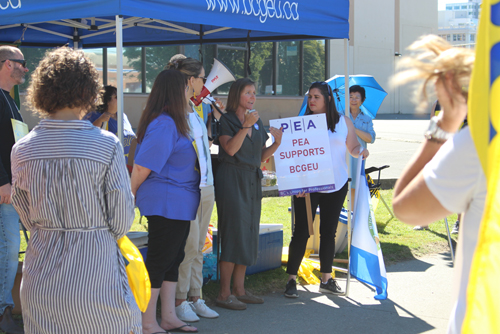
Moroz explains that the PEA collective agreement presently does not have any COLA protection clauses. “MLAs have that language, other collective agreements have that language. That is absolutely our main goal in this round of negotiations,” she told Island Social Trends downtown today.
Retaining professionals:
The Province already struggles with recruitment and retention of professionals in the public service. And if we don’t see these increases I think that problem is going to become more acute.
In terms of the members represented by PEA, that includes: engineers rebuilding highways and bridges after floods, geoscientists, psychologists who represent the most vulnerable youth in our province, agrologists who work with the farming communities, foresters who help us be prepared for forest fires and safeguard our forests for future generation.
“These are licensed professionals who work directly for the Province of BC,” says Moroz. She continues the list: veterinarians who work as fish pathologists or on bird flu issues, pharmacists that look into providing safe and cost effective drugs for the people of BC. “Our members play critical roles. and the government can’t afford to lose that. They are losing them to the private sector and municipal sector, and to other provinces,” she explained.
Strike not taken lightly:
“The cost of living in BC is very high,” says Moroz, clearly what everyone is experiencing nowadays, as she ties that to the needs of professionals as well.
“Professionals in this range of industries are legally allowed to strike, the PEA rep says. The organization has about 1,250 members who are BC government employees.
“We have an essential services agreement in place with the employer. Those services will be maintained, so there is no imminent danger to the people of BC. But many of our jobs are not essential for the BC Labour Relations code, so legally those people can strike. They are professionals “and they don’t take it lightly,” she emphasizes. “As professionals, they primarily identify with their professions.”
What’s coming up?
In 72 hours from now, what can be expected?
“We have no concrete plans to put up pickets imminently. We’re working on that now. Infrastructure projects could be delayed. that would be an area that they (the public) could see. All the projects that the province relies on could have an impact on the province’s bottom line … forestry projects, mining projects, transportation.”
PEA represents the engineers that work at the Ministry of Transportation and Infrastructure (MOTI). Several MOTI projects are on the go at any given time.
As for pharmacists, some are essential … like helping get drugs to correctional facilities, those won’t be impacted “It more at a policy level, like trying to negotiate good deals for drugs for people in BC.”
“So all those things would be slowed down, in a way that’s not helpful for anyone,” says Moroz on behalf of PEA.
“Some PEA members work in government, side by side with BCGEU members.”
In the employer’s court:
“The ball’s really in the employer’s court,” says Moroz. “I think a deal could be here. It’s really up to the province now. I think they’ve got the money. They just need to get to the table and get a deal. We certainly want one, and the BCGEU wants one. People don’t join a union to go backwards,” the PEA rep said.
Overall PEA has other chapters all around BC, including a large membership working in government offices, at the University of Victoria, as well as in legal aid, and family maintenance agencies. In small communities it’s not so much front line (e.g. workers in forestry, and Indigenous relations officers).
“It’s broader than this dispute. Most of our members are public sector, so they’re closely watching what happens at this table,” Moroz said today, adding: “This is the first domino, but there’s more to come.”
“It slows everything down, projects can’t go forward. And those projects bring in revenue for the province,” she explains.
===== RELATED:
BCGEU serves strike notice on provincial government (August 12, 2022)
===== ABOUT ISLAND SOCIAL TRENDS:
Island Social Trends is an independent news service on south Vancouver Island, operating since 2008 (first as MapleLine Magazine 2008-2010, then Sooke Voice News 2011-2013, then West Shore Voice News 2014-2020, before launching fully online as a digital news portal in mid-2020).
Island Social Trends Editor Mary P Brooke founded each of those publications, and continues to report on news of the west shore as well as Greater Victoria, BC and national news from the Vancouver Island vantage point.



